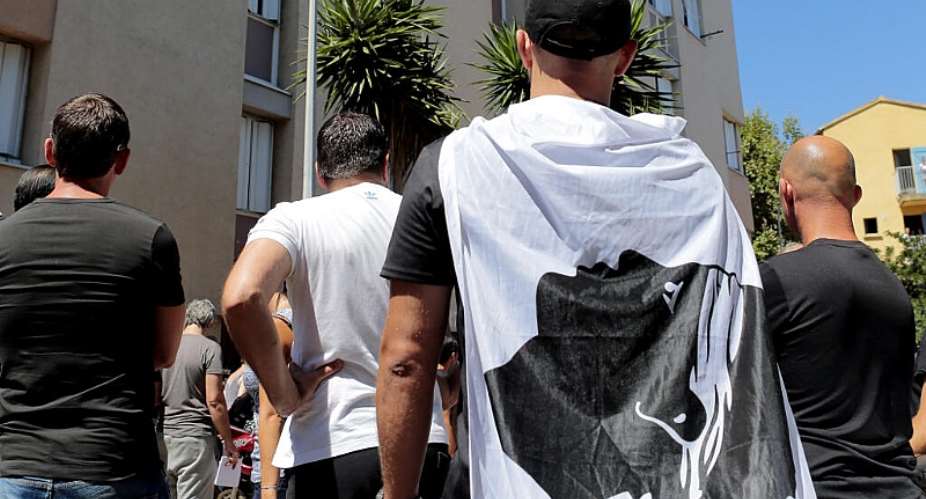Corsica's Assembly is set to vote on an agreement reached between the French government and the island's elected representatives regarding 'constitutional texts' that will provide for the recognition of autonomy for the island, while remaining within the Fifth Republic.
An agreement on Corsica's status of autonomy reached in Paris earlier this month, came after two years of negotiations and five hours of direct talks between Interior Minister Gérald Darmanin and eight Corsican elected representatives.
The positve outcome of the discussion has given rise to cautious optimism on the island of 340,000 inhabitants that has been led by Corsican nationalists since 2015.
Negotiations on what type of autonomy Paris can give to Corsica within the parameters of the French constitution, were launched after weeks of violence on the island in 2022, following the death of pro-independence militant Yvan Colonna.
Colonna was attacked in prison where he was serving a life sentence for the 1998 assassination of Corsican police prefect Claude Erignac.
The text being examined this Wednesday provides for the recognition of "a status of autonomy for Corsica within the Republic that takes account of its own interests linked to its Mediterranean insularity and to its historical, linguistic and cultural community that has developed a unique bond with its land".
According to Darmanin, it is now up to Corsica's President of the Executive Council, Gilles Simeoni, "to seek a broad consensus within the Assembly, beyond the Corsican autonomist and nationalist family".
It is on this condition that the President of the Republic would then invite the island's elected representatives to "begin more detailed constitutional discussions", he added.
Legislative power contested
Meeting in Ajaccio this Wednesday afternoon, the Corsican Assembly should see at least 45 of its 63 elected representatives agree on the text.
Simeoni's Corsican nationalist party holds an absolute majority of 32 seats with smaller parties, who hold a further 13 seats, having already approved the draft.
However, among the 16 elected members of the right-wing Un Soffiu Novu group, differences remain – particularly over the idea of granting the Corsican Assembly the power to legislate.
Jean-Martin Mondoloni, co-chairman of the group, says he refuses to "fall into the crude trap of those who do not want Corsica to be autonomous in Paris and who would find it very convenient to say that the Corsican elected representatives have not reached an agreement, so we are stopping everything".
He has called for there to be "four votes" to show that "there will be unanimity on three subjects in the text – recognition of an island community, power to adapt standards and consultation of Corsican residents – but not on the granting of legislative power".
The problem is that the draft resolution provides for the regional assembly to "vote for or against everything", in which case, he said, he will be "embarrassed but will vote against" the text.
Meanwhile, the pro-independence Nazione party – that only has one elected member – announced it would not vote in favour of the text, which it sees as "an obstacle to the recognition of the national rights of the Corsican people".
Opposition and jealousy
However, even if these hurdles are overcome by the regional assembly and the text is adopted, problems still remain within France's National Assembly where support for the draft is far from unanimous.
The right-wing, which holds a majority in the Senate, is hostile to constitutional reform which – in order to be validated – must be passed by both the National Assembly and the upper house before deputies and senators meet in Congress, where a three-fifths majority will be required.
In an article published recently in Le Figaro daily, 16 constitutional experts argued that creating "a special status" for Corsica with "local legislative power" was tantamount to "denying the fundamental principles of the first three articles of the Constitution."
France's satirical Canard Enchainé magazine has remarked that giving Corsica autonomy is making some regions jealous, with the presidents of the Brittany and Alsace looking for a "special status" for theire regions as well.
The publication has remarked, could this be "the start of an epidemic?"





 Lay KPMG audit report on SML-GRA contract before Parliament – Isaac Adongo tells...
Lay KPMG audit report on SML-GRA contract before Parliament – Isaac Adongo tells...
 Supervisor remanded for stabbing businessman with broken bottle and screwdriver
Supervisor remanded for stabbing businessman with broken bottle and screwdriver
 NDC watching EC and NPP closely on Returning Officer recruitment — Omane Boamah
NDC watching EC and NPP closely on Returning Officer recruitment — Omane Boamah
 Your decision to contest for president again is pathetic – Annoh-Dompreh blasts ...
Your decision to contest for president again is pathetic – Annoh-Dompreh blasts ...
 Election 2024: Security agencies ready to keep peace and secure the country — IG...
Election 2024: Security agencies ready to keep peace and secure the country — IG...
 People no longer place value in public basic schools; new uniforms, painting wil...
People no longer place value in public basic schools; new uniforms, painting wil...
 'Comedian' Paul Adom Otchere needs help – Sulemana Braimah
'Comedian' Paul Adom Otchere needs help – Sulemana Braimah
 Ejisu by-election: Only 33% of voters can be swayed by inducement — Global InfoA...
Ejisu by-election: Only 33% of voters can be swayed by inducement — Global InfoA...
 Minority will expose the beneficial owners of SML, recover funds paid to company...
Minority will expose the beneficial owners of SML, recover funds paid to company...
 Prof. Opoku-Agyemang has ‘decapitated’ the NPP’s strategies; don’t take them ser...
Prof. Opoku-Agyemang has ‘decapitated’ the NPP’s strategies; don’t take them ser...
